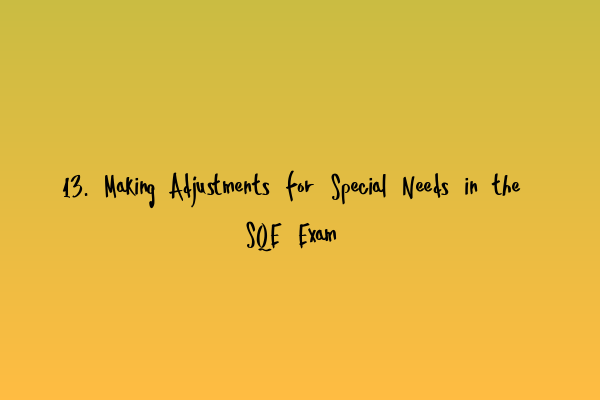Making Adjustments for Special Needs in the SQE Exam
As the Solicitors Qualifying Examination (SQE) becomes the standard for qualification as a solicitor in England and Wales, it is essential to ensure that all individuals have an equal opportunity to demonstrate their legal knowledge and skills. This includes candidates with special needs or disabilities who may require adjustments to the examination process.
At SQE Exam Law, we believe in promoting inclusivity and accessibility. In this article, we will explore the various adjustments that can be made for candidates with special needs in the SQE exam. Whether you are a candidate with a disability or an aspiring solicitor looking to understand the examination accommodations, this guide is for you.
Understanding Special Needs Adjustments
The SQE recognizes that candidates with certain disabilities or special needs may require reasonable adjustments to allow them to demonstrate their legal knowledge and skills effectively. These adjustments are designed to level the playing field and ensure that all candidates have a fair opportunity to succeed in the exam.
Adjustments can range from providing extra time to candidates with specific learning difficulties to allowing the use of assistive technologies or resources. The key is to provide a reasonable adjustment that does not undermine the integrity of the examination but aids candidates in showcasing their abilities.
Types of Adjustments
Here are some common types of adjustments that can be made for candidates with special needs:
- Extra Time: Candidates with certain disabilities or conditions, such as dyslexia or ADHD, may be eligible for additional time to complete the exam. This allows them to process information at their own pace and demonstrate their knowledge effectively.
- Access to Assistive Technology: Candidates who require assistive technology, such as screen readers or speech-to-text software, can request access to these tools during the examination. This ensures that their special needs are accommodated and they can perform to the best of their abilities.
- Alternative Exam Formats: In some cases, candidates may need alternative exam formats, such as Braille or large-print papers, to ensure accessibility. These formats allow candidates with visual impairments or other reading difficulties to engage with the exam content effectively.
- Separate Examination Room: A separate examination room can be provided to candidates who require a quiet and distraction-free environment due to conditions such as anxiety or autism. This adjustment helps them focus and enhances their performance during the exam.
- Reader or Scribe: Candidates who have difficulty reading or writing due to disabilities can request the assistance of a reader or scribe during the exam. This ensures that their responses are accurately recorded and that they can fully engage with the examination content.
It is important to note that these are just a few examples of the adjustments that can be made. The specific accommodations provided will vary depending on the individual’s needs and the decision of the examination board.
How to Request Adjustments
If you believe you may require adjustments for the SQE exam due to special needs or disabilities, it is crucial to make the necessary arrangements in advance. Here is a step-by-step guide on how to request adjustments:
- Identify Your Needs: Assess your requirements and determine the specific adjustments that would allow you to perform at your best during the exam. Take into account any previous accommodations you may have received in educational or professional settings.
- Contact SQE Exam Law: Reach out to the SQE Exam Law team to discuss your needs and request the necessary adjustments. Our experienced professionals will guide you through the process and ensure that your requirements are appropriately addressed.
- Provide Supporting Documentation: In most cases, you will be required to provide supporting documentation, such as medical or educational reports, demonstrating your special needs or disabilities. Make sure to gather all relevant information and submit it along with your request.
- Deadlines: Be aware of the application deadlines for requesting adjustments. It is advisable to submit your request well in advance to allow sufficient time for the examination board to review and process your application.
Remember, it is your right as a candidate with special needs to request reasonable adjustments. The examination board is committed to ensuring fairness and equal opportunities for all candidates, and they are legally obligated to provide these accommodations where appropriate.
Conclusion
As the SQE exam becomes the gateway to a legal career in England and Wales, it is essential to ensure that candidates with special needs or disabilities have an equal opportunity to demonstrate their legal skills and knowledge. Adjustments can be made to accommodate these individuals, ensuring a fair and inclusive examination process.
If you think you may require adjustments for the SQE exam, be proactive and take the necessary steps to request them. Reach out to SQE Exam Law and provide the necessary documentation to support your case. Remember, your success should not be hindered by your special needs or disabilities – with the right adjustments, you can thrive in the SQE exam and embark on a successful legal career.
For more information about SQE preparation, practice exams, and key dates, check out our related articles:
